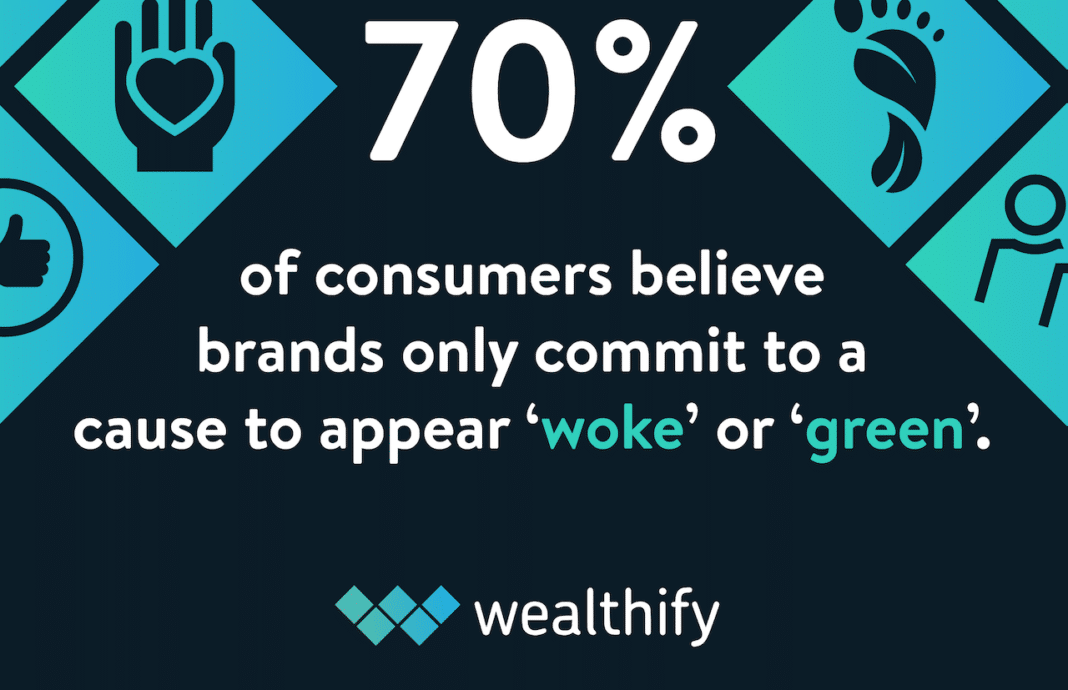To coincide with Earth Day, marked globally today, a new survey has been launched ‘unearthing’ the ethical and sustainable shopping habits of consumers in England, Scotland, Northern Ireland and Wales.
The survey was carried out by Wealthify, an online investor which provides consumer investment opportunities with organizations committed to ‘having a positive impact on society and the environment’.
It reveals that over three quarters (76%) believe that supporting ethical, sustainable brands is important in everyday life, but 78% of UK adults admit they’re unable to identify when a brand is greenwashing. Broken down by age, just 37% of 18-24-year-olds say they could tell the difference, with the number in the 65-plus age group much lower at 6%.
Crucially, 70% agree that some brands commit to environmental and social causes in order to appear ‘woke’ or ‘greener’; among the 18-24-year-olds the figure is 79%.
21% believe that a company’s commitment to causes beyond its own business agenda is the most important factor when choosing which ethical brands to support. Other issues cited by respondents in order of importance were: cruelty-free products (59%); locally or ethically sourced materials (43%); zero-waste solutions (43%); and being a Living Wage employer which prioritizes the health and wellbeing of its staff (38%).
Societal pressure to ‘be more ethical’ influences one in five (42.4%), with Gen Z feeling it the most acutely at 64%.
London and Scotland were identified as the most ‘ethically-minded’ regions, while consumers in Northern Ireland spend the most on ethical products per month. In Yorkshire, the Humber and Wales sustainable shopping is viewed as less important by 71%, and where gender split is concerned the results show that women buy more ethical beauty products than men (24% vs 14%), while men spend more on food and drink (55% vs 50%). Male consumers spend £7.49 more than women on ethical/sustainable products each month.
Over half (53%) of overall respondents view cost as a barrier, saying the price of sustainable products is ‘holding us back’ from leading more ethical lives, but the majority (56%) would be willing to pay more for a product which is sustainable.
25% admit to ‘not knowing where to start looking for ethical brands’. Interestingly, being ethical was found to be most important (80%) to those in the lowest household incomes of £5,001 – £10,000.
The majority of us are unable to identify if a brand is ‘greenwashing’ and many of us agree that brands commit to causes to appear ‘greener’
Shoppers in contrasting age groups seek information from different sources: among 18-24-year-olds one in four rely on celebrity endorsement ‘to determine a brand’s green credentials’ while in the 65-plus group the same number rely on word of mouth.
Michelle Pearce-Burke, COO at Wealthify, comments: “We know that conscious consumerism is on the rise and see this reflected in the investment decisions being made by an increasing number of our customers. Coronavirus has also encouraged many of us to shop more locally and ethically than in pre-pandemic times.
“Our survey has established that this is the case – most of us do believe that supporting ethical and sustainable brands in our day-to-day lives is important. What’s interesting is that the majority of us are unable to identify if a brand is ‘greenwashing’ and many of us agree that brands commit to causes to appear ‘greener’.
“This, paired with the fact that many people continue to find ethical and sustainable products too expensive to make them part of their day-to-day lives, indicates a potential need for more education around what ethical and sustainable brands stand for, and the value for money people receive in spending more on a more sustainable product.
“The significant increase we have seen in customers opting for our ethical investment plans over the past year has meant that their uptake is now outstripping our standard investment plans by almost two to one. What’s more, investment returns on our ethical plans last year actually outperformed our original investments, demonstrating the added value of consuming, purchasing or investing ethically.”
To mark Earth Day, Wealthify has created an ethical shopping and investment guide ‘to help consumers navigate living more sustainably’. This includes league tables featuring growing ethical businesses and larger brands ‘that inspire when it comes to sustainability activities’. The investment company will be planting one tree for every new Ethical investment Plan opened during Earth Day week.











